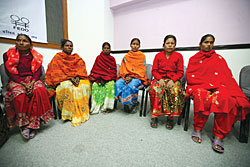 KIRAN PANDAY |
When Chaudhary's husband, a labourer in India, returned the couple went to the police station but could not file a complaint. "They said it was a personal matter, it should be solved in the community." Jug Chaudhary did not receive justice. She is living in the same village, in the same Dalit community as those who accused and assaulted her.
Chaudhary made the journey to Kathmandu to talk at a public forum last week. It is extremely difficult for her to talk about what she went through publicly. She has to stop many times and her voice cracks when she describes how helpless she felt when she realised there was noone she could turn to.
She has now decided to leave her four children in the village and move to India to look for jobs. But she has this to say:
"I came all the way to Kathmandu to talk about this because I do not want other Nepali sisters to go through what I did."
Five other women from Dalit and other minority communities in Lalitpur, Saptari, Siraha, Kailali, Sunsari and Makwanpur also speak at the forum. Each was branded a witch and humiliated in front of their communities. In each case the perpetrators have been let off the hook. Noone has come to apologise to the women for treating them like animals. They are awaiting justice, but living in fear of being targeted again. "I can't sleep because I am afraid they are going to come back for me," says Chaudhary.
These are not the only cases. But we only hear of those cases where brave women actually talk to journalists and file cases with the police. There are thousands of Nepali women who quietly bear the ordeal of being labelled a witch. The victims mostly belong to largely illiterate, extremely poor Dalit communities, considered untouchables in Nepal.
Nepal's legal system does not have provisions to punish those involved in witch-hunts. If a complaint is filed and the guilty apprehended they are imprisoned for a short duration and slapped with a fine. The Ministry of Women, Children and Social Welfare and Nepal's Women's Commission are only just recognising the legal vacuum and have drafted laws against the practice. But we are still a long way from actually having a law that fully addresses this problem.
However, Nepal has been a party to the Convention on the Elimination of All Forms of Discrimination against Women since 1991. This international convention has clear provisions against gender violence. The state is obligated to amend domestic laws to conform to the spirit of the convention, follow the convention to the letter, or provide legal redress in cases where rights have been violated. Nepal has also signed nearly two dozen conventions on human rights, all of which touch upon gender violence. So to say we don't have laws in place is a cop-out, pure and simple.
Witch-hunting is an extreme form of gender violence and the reason it is not taken seriously is because the victims are usually from marginalised communities. Nepal's gender movement has made amazing strides, but it has done little for this community of victims.
Activists in Kathmandu can push for laws against witch-hunting while those in the field can work to spread awareness against the medieval superstitions that target these women. The Nepal Police, too, needs to include a chapter on how to address crimes related to superstition in their training manuals.
Three years ago in June, the interim parliament declared Nepal an 'untouchability-free nation'. Such empty proclamations mean little to women like Jug Chaudhary. This year, Prime Minister Madhav Kumar Nepal acknowledged the state's failure to deliver on its promises, saying, "it is unfortunate that we haven't been able to implement this declaration in practice."



